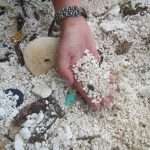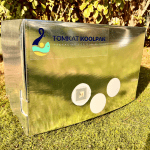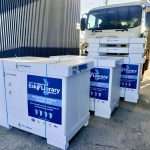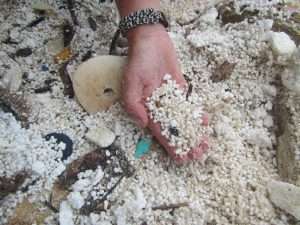Phase 1 Trial – IOT Esky Library Initiative
Source Reduction Plan (SRP) Overview
Name of SRP
Partners Delivering the SRP
Tangaroa Blue Foundation – Project lead of SRP, responsible for participant engagement, data collection and synthesis, project reporting.
Australian Marine Parks – Funding partner.
Phosphate Resources Limited (PRL) – Funding Partner, 10 employee participants involved in Phase 1 Trial.
Location
Christmas Island, Indian Ocean Territories
Photo 1
Evidence of the issue

Photo 2
Evidence of SRP resources

Photo 3
Evidence of positive outcomes

Overall Goals & Background
Targeted Debris
Expanded Polystyrene Eskies
The Esky Library aims to replace single-use expanded polystyrene eskies with a sustainable, reusable alternative, thereby significantly reducing polystyrene waste and extending the lifespan of local landfill resources. The library will operate as a centralised resource where individuals and businesses can borrow reusable eskies, mitigating the need for disposable polystyrene packaging.
The TomKat KoolPak reusable esky is a sustainable, reusable, traceable, and recyclable packaging solution for the global transportation of temperature-sensitive and perishable products. Designed for multiple reuses, the KoolPak has been market-tested, with a single unit being used thirty times, compared to current polystyrene eskies that are used once and typically end up in landfill. The outer lid and base are fully circular, with 90%+ post-consumer recycled content. The thermal liner is recycled through other value streams, and each reusable esky can be recycled locally in Perth. Additionally, the Esky Library receives a cash refund from the producer for each recycled unit.
There has previously been no alternative to fresh food air freight packaging for the IOT. There are no bans or recycling of polystyrene packaging in the IOT. This solution provides an alternative with a superior reusable product with the overall goal of reducing the use of polystyrene waste for fresh food deliveries to this region.
Why is the SRP needed?
Expanded polystyrene is a major contributor to marine debris in the IOT, with the Australian Marine Debris Initiative (AMDI) Database having consistently identified polystyrene as the top marine debris item on Christmas Island (CI) since 2011.
One of the on-island polystyrene sources is polystyrene eskies used in fresh food air freight. The IOT receives around 255 polystyrene eskies every fortnight, totalling 6,650 boxes annually and adding approximately 216 cubic metres of waste to local landfills (equivalent to 901 kerbside wheelie bins). All fresh food air freight is funnelled via one carrier and from only a few suppliers, reducing the number of stakeholders required to participate to a more manageable number.
Without polystyrene bans or recycling options on CI, these eskies degrade quickly in the tropical sun, releasing millions of particles into the environment.
Logistics
Timeline and Project Goals
Phase 1: A small-scale trial with 20 community members from Christmas Island 10 PRL employees- in combination with one supplier, Hambleys IGA. The trial will be run between February and April 2025.
Phase 2: A 12-month period, requiring additional investment to scale the project, expanding to include more suppliers and a large customer base across the IOT region. June 2025-June 2026.
Phase 3: There is an expectation that the initiative will be self-sufficient and ongoing. The initiative will be handed over to the community coordinator, and it will not require additional funding. June 2026.
Goals:
Given the IOT’s waste management challenges and limited landfill space, a reusable esky library presents a crucial solution. This initiative would significantly reduce polystyrene waste, build awareness about the impacts of single-use packaging in the IOT, protect the environment, and extend the lifespan of landfill resources.
The Phase 1 trial aims to successfully introduce the initiative, gather feedback on the process and make improvements to ensure a streamlined roll out to the entire IOT region.
Measuring Success
Online surveys will be used through the Phase 1 trial to measure the shift in participant’s behaviour and awareness, as well as highlight any improvements to be made.
Using the KoolPak App, every rotation of the reusable eskies will be tracked- highlighting the direct saving of polystyrene waste with the use of the reusable eskies.
Assets:
- Branded KoolPak Eskies
- Branded KoolPak Transit Pack to transport empty eskies on their return to Perth.
- Training manuals for suppliers and participants in the establishment of the initiative
- Promotional video for Esky Library Trial
Target Audience:
All residents and businesses in the IOT region that order fresh food deliveries from the mainland via air freight.
Data Collection & Reporting
Phase 1 trial will be carefully monitored via online surveys, which are compulsory for all participants with every order received. These surveys will yield valuable feedback about the efficiency of the Esky Library process to allow for improvements and to track any behavioural or awareness shifts in the participants. Questions have been tailored to measure changes in each household’s actions and thought processes around using single-use packaging and its impacts on our local environment.
The traceable nature of the reusable KoolPak esky via the KoolPak App will show the uses of each esky throughout its entire lifecycle- creating data on the direct saving of polystyrene packaging used.
Following the Phase 1 trial and the completion of the participant surveys, including a review from involved stakeholders, a report will be created to highlight shifts in behaviour & awareness, the saving of polystyrene use, and any improvements required before Phase 2.
Phase 2 and the continuation of the initiative will continue to track the use of the reusable eskies via the KoolPak App and the saving of ESP waste that each rotation of deliveries creates.
Results and Reflections
Positive Outcomes
TBC ongoing
Funding
We would like to thank Australian Marine Parks and Phosphate Resources Limited (PRL) for their funding support for this project.
Challenges & Improvements
Future Opportunities






